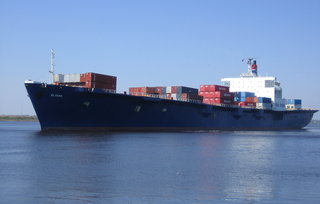Family members of several crew members lost aboard the El Faro raised questions about the ship's trajectory and lifeboats in a Jan. 3 "60 Minutes" segment on the sinking of the 790’x95’ TOTE Maritime ro/ro containership.
“Why was a ship that had been grandfathered in to not have the enclosed lifeboats being allowed to sail with just the open hull, like, whaling lifeboats and expecting people to survive in that?”
That was the question posed by Glen Jackson, brother of mariner Jack Jackson, to Scott Pelley, the CBS correspondent on the story.
The condition and accessibility of the lifeboats afford the El Faro has been a widely debated question since the ship sank Oct. 1 in Hurricane Joaquin.
Tinisha Thomas, who lost her husband Shawn, wondered why the ship proceeded into the storm:
"I asked the company a question — why did they allow the ship to continue to go into the storm?"
These are questions that the National Transportation Safety Board is aiming to answer as part of its investigation into the sinking.
“We're looking at the oversight and the direction, and the advice provided by the operating company, TOTE, to see what information was available to [the captain]," Tom Roth-Roffy, the lead NTSB invesigator told Pelley. "Certainly also we're looking at the weather forecast. The accuracy and the timeliness of the information when he made the decision to sail where he did.”
Roth-Roffy said that from the information the invesigators have received so far, there was "no direct guidance by the company to sail on the route he chose."
Not all family members accept this — Glen Jackson said he placed responsibility for the sinking "squarely on TOTE Maritime."
“You gotta understand, commercial shipping," Thomas said. "They gotta keep that ship moving to make money. And it — that's the whole horror of this tragedy is that 33 people died so that frozen chickens could be delivered on time in Puerto Rico. That's it.”
Deb Roberts, whose son Michael Holland was aboard the El Faro, said she felt the violence of the storm caused the sinking.
“I’m not a professional," Roberts said. "I'm not an engineer, I'm a business manager. I think it was a series of unfortunate events and without any other information I truly blame it on Hurricane Joaquin.”
The NTSB has said it will take at least a year to complete the investigation into the loss of the El Faro and her crew, but NTSB chair Christopher Hart expressed confidence that the agency would be able to determine the cause, even in the absence of the ship's voyage data recorder, which has not been recovered. The NTSB told the Associated Press that they are considering reopening the search for the VDR.
"I'm sure that it will be difficult given the situation, 15,000 feet of water, no voyage data recorder yet. We may still find it, but given that we have a history of finding out what happened even in the most difficult circumstances. And I'm comfortable to say that we will be able to do that again."
Read a full transcript of the story on the "60 Minutes" website.




